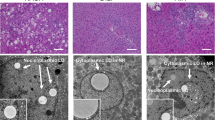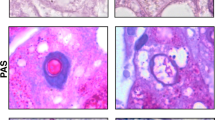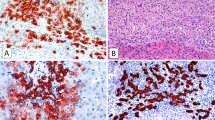Abstract
SEVERE nuclear vacuolation has been observed in the liver cells of human diabetics1–3, of infants suffering from malnutrition2 and of patients suffering from various diseases2–5, but has not been reported in experimental diabetes, whether produced by pancreatectomy or by alloxan in laboratory animals. The factors promoting nuclear vacuolation still await investigation.
This is a preview of subscription content, access via your institution
Access options
Subscribe to this journal
Receive 51 print issues and online access
$199.00 per year
only $3.90 per issue
Buy this article
- Purchase on Springer Link
- Instant access to full article PDF
Prices may be subject to local taxes which are calculated during checkout
Similar content being viewed by others
References
Warren, S., “The Pathology of Diabetes Mellitus” (2nd edit., Lea and Febiger, 1938).
Gillman, J., and Gillman, T., “Perspectives in Human Malnutrition”, 238, 305 (Grune and Stratton, 1951).
Cazal, P., and Mirouze, J., Presse médicale, No. 28, 571 (1951).
Camain, R., from Bull. méd. l'Afrique-occidentale française, 9, fasc. 2 (1952).
Haex, A. J., de Jong, J. J., and van Beek, C., Nederl. Tijdschr. v. Geneesk., 87, 923 (1943).
Author information
Authors and Affiliations
Rights and permissions
About this article
Cite this article
GILLMAN, J., GILBERT, C. Nuclear Vacuolation in the Liver Cells of Depancreatized Baboons. Nature 177, 666–667 (1956). https://doi.org/10.1038/177666a0
Issue Date:
DOI: https://doi.org/10.1038/177666a0
This article is cited by
Comments
By submitting a comment you agree to abide by our Terms and Community Guidelines. If you find something abusive or that does not comply with our terms or guidelines please flag it as inappropriate.



